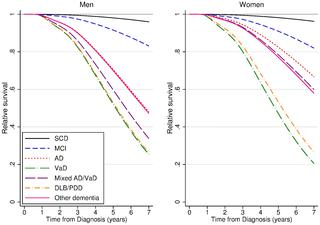PLOS ONE ( IF 2.9 ) Pub Date : 2018-09-21 , DOI: 10.1371/journal.pone.0204436 Bjørn Heine Strand 1, 2, 3, 4 , Anne-Brita Knapskog 2 , Karin Persson 1, 2 , Trine Holt Edwin 1, 2 , Rachel Amland 1, 2 , Marit Mjørud 1 , Espen Bjertness 4 , Knut Engedal 1, 2 , Geir Selbæk 1, 2, 5

|
Introduction
Alzheimer’s disease patients are reported to have higher survival rate compared to patients with vascular dementia or dementia with Lewy bodies. There is a paucity of studies investigating survival including persons with cognitive decline and dementia of various aetiologies.
Objectives
We aimed to compare survival for patients with subjective cognitive decline, mild cognitive impairment, Alzheimer’s disease, vascular dementia, mixed Alzheimer’s/vascular dementia, dementia with Lewy bodies/Parkinson’s disease, and other dementias compared to the general Norwegian population, taking into account the role of gender, cognitive function, function in everyday activities, comorbidity and education.
Methods
Patients (N = 4682), ≥65 years, in the The Norwegian register of persons assessed for cognitive symptoms (NorCog) during 2009–2017 were followed for mortality in the National Registry until January 2018. Flexible parametric survival models were applied to estimate relative survival, life expectancy and years of life lost for diagnostic groups compared with the general population.
Results
Patients with vascular dementia or dementia with Lewy bodies/Parkinson’s had the shortest survival, followed by mixed dementia, Alzheimer’s disease, unspecified dementia, mild cognitive impairment and subjective cognitive decline. At age 70 years, men with vascular dementia or dementia with Lewy bodies/Parkinson’s had life expectancy of 4.7 years, which corresponded to 10.3 years of life lost compared to the general population. Years of life lost for other diagnoses were 10.0 years for mixed dementia, 9.2 years for Alzheimer’s disease, 9.3 years for other dementias, 5.2 years for mild cognitive impairment and 2.2 years for subjective cognitive decline. Corresponding years of life lost in women were: 12.7 years, 10.5 years, 9.8 years, 10.6 years, 7.8 years, and 2.6 years. Poor relative survival among dementia patients was associated with male gender, comorbidity, low cognitive function, and low function in activities of daily living.
Conclusions
Compared with the general population, patients with subjective cognitive decline had no significant loss in life expectancy, while patients with mild cognitive impairment and all dementia subtypes had large losses, especially those with a diagnosis of vascular dementia or dementia with Lewy bodies/Parkinson’s.
中文翻译:

挪威痴呆症、轻度认知障碍 (MCI) 和主观认知衰退 (SCD) 的各种病因导致的生存率和寿命损失年数
介绍
据报道,与血管性痴呆或路易体痴呆患者相比,阿尔茨海默病患者的生存率更高。很少有研究调查包括认知能力下降和各种病因的痴呆症患者的生存情况。
目标
我们的目的是比较主观认知能力下降、轻度认知障碍、阿尔茨海默病、血管性痴呆、混合性阿尔茨海默病/血管性痴呆、路易体痴呆/帕金森病以及其他痴呆症患者与挪威普通人群的生存率,并考虑到性别的作用、认知功能、日常活动功能、合并症和教育。
方法
2009-2017 年挪威认知症状评估患者登记册 (NorCog) 中年龄≥65 岁的患者 (N = 4682) 在国家登记册中进行死亡率跟踪直至 2018 年 1 月。应用灵活的参数生存模型来估计相对死亡率与一般人群相比,诊断组的生存率、预期寿命和寿命损失年数。
结果
血管性痴呆或路易体痴呆/帕金森病患者的生存期最短,其次是混合性痴呆、阿尔茨海默病、未特指痴呆、轻度认知障碍和主观认知下降。 70 岁时,患有血管性痴呆或路易体痴呆/帕金森氏症的男性的预期寿命为 4.7 年,相当于普通人群的寿命损失 10.3 年。其他诊断导致的寿命损失年数为混合性痴呆 10.0 年、阿尔茨海默病 9.2 年、其他痴呆 9.3 年、轻度认知障碍 5.2 年和主观认知衰退 2.2 年。女性相应的寿命损失年数为:12.7年、10.5年、9.8年、10.6年、7.8年和2.6年。痴呆患者的相对生存率较差与男性、合并症、认知功能低下和日常生活活动功能低下有关。
结论
与一般人群相比,主观认知能力下降的患者预期寿命没有明显下降,而轻度认知障碍和所有痴呆亚型患者的预期寿命都有较大下降,特别是那些诊断为血管性痴呆或路易体/帕金森病痴呆的患者。











































 京公网安备 11010802027423号
京公网安备 11010802027423号